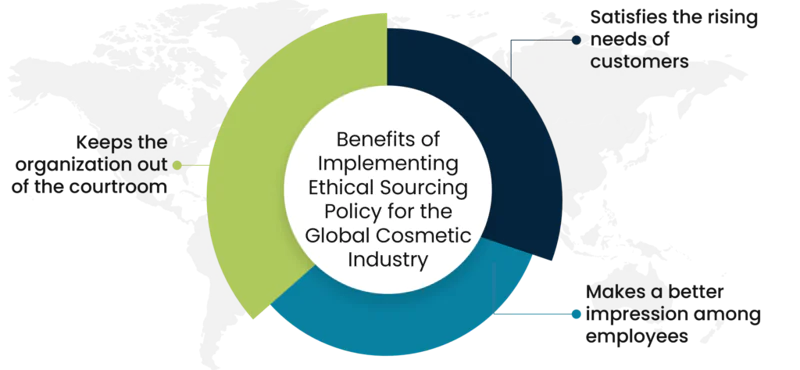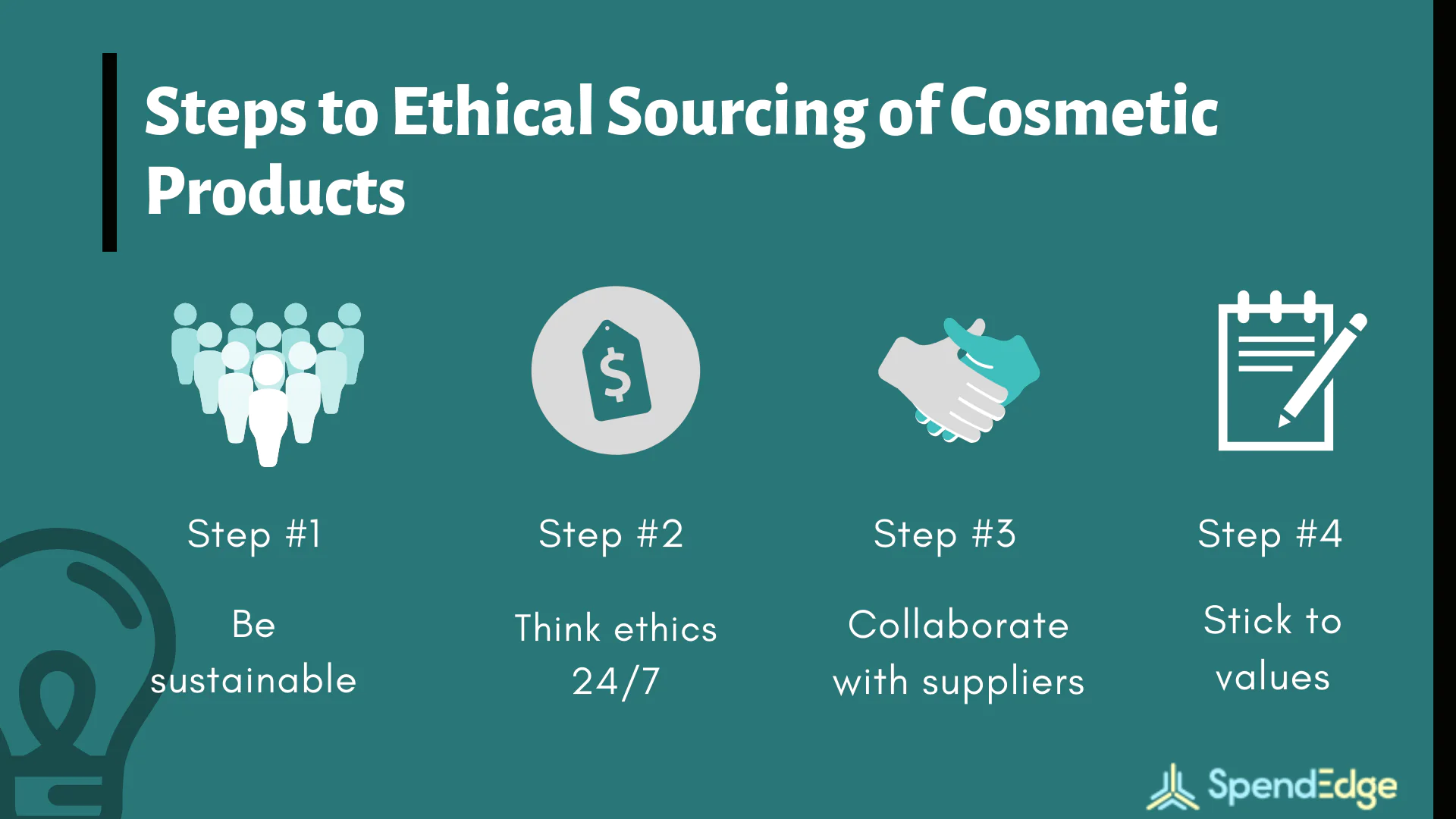Key Takeaways:
- The global cosmetic industry is transitioning towards ethical sourcing practices driven by consumer demand for sustainable and socially responsible products.
- Consumers prefer cosmetic brands with ethical sourcing policies, leading to increased market demand for sustainable and cruelty-free products.
- Implementing an effective ethical sourcing policy is crucial for cosmetic companies to mitigate risks, improve brand image, and meet evolving consumer expectations.
- Companies can ensure ethical sourcing of cosmetic products by embracing cruelty-free and vegan practices, evaluating suppliers rigorously, monitoring supplier contracts, and prioritizing Fairtrade certification.
What are ethically sourced products?
Ethically sourced products are products and services that are acquired through an ethical supply chain process. This entails businesses actively ensuring the upholding of labor rights, maintaining safe working conditions, and adhering to ethical standards as they procure goods from their suppliers.
In the global cosmetic industry, many companies have historically engaged in unethical product sourcing practices. However, spurred by shifting consumer preferences and the rise of ethical consumerism, cosmetic companies are now prioritizing sustainable development. This paradigm shift encompasses environmental, ethical, and sustainability initiatives, leading to the adoption of ethical sourcing practices and the use of sustainably sourced materials.
Ethical sourcing involves ensuring that raw materials for cosmetic products are obtained in a responsible and ethical manner. This entails adhering to ethical standards throughout the supply chain management process, from sourcing to production. Ethical brands prioritize fair treatment and compensation for workers, while also considering environmental issues such as deforestation. By embracing responsible sourcing practices and ethical production practices, cosmetic companies contribute to the market for sustainable products and promote sustainable practices within the industry.
Devising an effective ethical sourcing policy is vital for companies selling cosmetic products. To know how our experts can help you gain accurate market insights.
The Reason for Sourcing Products Ethically in Cosmetic Industry
Consumers viewpoint
Consumers of today are boycotting brands for their irresponsible actions and are shifting towards cosmetic products with a social environmental benefit. They prefer companies advocating for issues they care about and having an effective ethical sourcing policy.
According to our experts, a vast majority of customers are willing to spend more on a product if it comes from a sustainable brand. The increasing buying power of the millennial population is also expected to keep this trend growing.
Smart cosmetic companies are paying attention and preparing an ethical sourcing policy that can address the changing requirements of cosmetic products. They focus their efforts on creating vegan products with less packaging waste, using natural and safe ingredients, and taking pride in cruelty-free labels. Also, they develop a supplier code of conduct, visit their suppliers to trace ingredients, meet the growers and ensure that they work in good conditions. They also take care of the environment and convey their sourcing practices loud and clear to their consumers.
To gain a comprehensive understanding of our intelligence services that help in sourcing
Companies viewpoint
Companies often think of devising an ethical sourcing policy when they realize the need to mitigate risks, reduce operating costs, improve their brand image, and meet evolving consumer demands. Developing any kind of ethical sourcing policy and implementing it can be a massive undertaking for companies, but if done correctly, the results can significantly increase profits and the brand value in the global cosmetic industry. Leading cosmetic companies are already leading the way through sourcing and the rest of the companies need to embrace it as well. Here are a few tips that can help companies ensure ethical sourcing of cosmetic products.
Tips to Ensure Ethical Sourcing of Cosmetic Products
Be cruelty-free and vegan
Although animal testing for cosmetics is banned by the European Union, the majority of the world still permits it. The cruelty-free label guarantees that the company is neither testing its cosmetic products on animals nor using animal ingredients in the cosmetic products.
Evaluate suppliers:
Companies selling cosmetic products need to do proper research on their suppliers before sourcing products. They should look for organic materials to ensure a fail-safe way to avoid nasty, artificial chemicals reaching their consumers.
Monitor supplier contracts:
Make points in initial supplier contracts that audit, and spontaneous checks of raw materials used in the cosmetic products may occur. This helps brands to maintain higher standards at all times and ensure quality cosmetic products.
Ensure its a Fairtrade:
Cosmetic products use many agricultural products, which are often grown by overworked and underpaid laborers. Companies in the global cosmetic industry should look for Fairtrade cosmetic products that can ensure that growers involved in the process are paid a fair amount.
Set Example:
Make sure that the ethical practices are being followed not just by the suppliers but also by the organization. Take a close look at the business and adhere to ethical sourcing practices that are expected out of suppliers. Companies can also learn from organizations that are successfully implementing an ethical sourcing policy. To gain detailed insights into the ethical sourcing standards and practices adopted by companies sourcing cosmetic products, request more information here!
Steps to Ethical Sourcing of Cosmetic Products
Benefits of Implementing Ethical Sourcing Policy for the Global Cosmetic Industry

Keeps the organization out of the courtroom
Around 25 million individuals in the world are trapped in forced labor, making ethical sourcing an important issue in different industries. Implementing an ethical sourcing policy can help companies to ensure compliance with laws enforced by different governments and focus on developing cosmetic products that can reach the uppermost levels of innovation and effectiveness.
Satisfies the rising needs of customers
Implementing an effective ethical sourcing policy can make a brand more popular and attractive to customers. It can act as a differentiating measure for companies, thus, helping them to increase brand value and create social impact. Ethical sourcing policy can further influence purchasing decisions of consumers and could be a game changer in the global cosmetic industry, as a large section of consumers comprises of millennials.
Makes a better impression among employees
Talent quality, talent management, and talent retention are? key priorities for companies in the cosmetic industry. Ethical sourcing policy not only helps cosmetic brands create a better impression among customers and clients but also makes companies a more attractive employer. This helps companies to improve business processes, retain loyal employees, that translates to financial bonus and productivity climbs in the long run.
Alternative Testing Methods for Cruelty-Free Cosmetic Products
New approaches for evaluating the environmental friendliness of cosmetic goods have been introduced as a result of the experts’ ongoing technological and equipment upgrades. Here are three alternative testing methods for cruelty-free cosmetics:
In Vitro Testing
Instead of using live animals, in vitro testing entails performing studies on cell cultures or tissues in a controlled laboratory setting. The use of this technique spares animals from suffering while simulating the effects of cosmetics on human skin or other body parts. Numerous characteristics, including skin irritancy, corrosion, and absorption, can be measured in vitro.
Computer Modeling and Simulation
Advanced software is used in computer modeling and simulation approaches to forecast the possible impacts of cosmetics. This strategy makes use of databases that include information on numerous substances and how they interact with human tissues. Animal testing is no longer necessary because computational models can accurately anticipate things like skin absorption, toxicity, and metabolism.
Organ-on-a-Chip Technology
Organ-on-a-chip technology imitates the structure and operation of real organs by fabricating small copies of human organs on microchips. These “chips” are made up of living cells that behave in a way similar to the tissues and organs of people. Researchers can create organ-on-a-chip models of skin, eyes, and other key tissues for cosmetics testing to analyze how products interact with these tissues without using animals.
To gain more knowledge on cosmetic sourcing and SpendEdge sourcing intelligence
Conclusion
The global cosmetic industry is witnessing a significant shift towards ethical sourcing practices and sustainable development, driven by changing consumer preferences and the rise of ethical consumerism. This transition underscores the importance of adhering to ethical standards throughout the supply chain management process, from sourcing to production, to ensure the availability of ethically sourced products and sustainably sourced materials. By embracing responsible sourcing practices and ethical production practices, cosmetic companies not only contribute to the market for sustainable products but also address environmental issues such as deforestation. This commitment to ethical sourcing not only enhances the brand image but also satisfies the rising demand for ethical brands among consumers. Implementing an effective ethical sourcing policy is essential for companies in the global cosmetic industry to mitigate risks, reduce operating costs, and meet evolving consumer demands. By prioritizing sustainable practices and ethical standards, cosmetic companies can keep themselves out of legal trouble, satisfy customer needs, and create a positive impression among employees. Overall, ethical sourcing practices play a pivotal role in promoting sustainable practices and environmental stewardship within the cosmetic industry.





